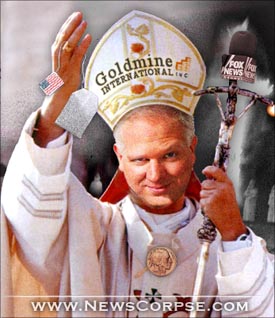Glenn Beck began his program yesterday asking his audience to…
“Join me on another one of my ‘designed just to get TV ratings’ history lessons?”
The only the wrong with that statement is everything in it. First of all, nobody is joining Beck as he embarks on his solo venture across the blackboard seas of his dementia. The best you say is that his disciples can watch glassy-eyed from afar. Secondly, everything Beck does is designed to get TV ratings, despite his snarky allusions to the contrary. And lastly, his idea of history lessons leaves out a major component of the curriculum: the history.
 In yesterday’s lecture, Beck sought to explain the concept of “Mutually Assured Destruction,” wherein nations in conflict proposed deterrence of aggression by threatening overwhelming retaliatory response that would effectively destroy both nations. Beck began by falsely asserting that scientists had first proposed a version of MAD that involved a “Doomsday Device,” wherein the whole planet would be obliterated. In fact, that was only proposed by analysts at an Ayn Rand think tank and Stanley Kubrick in “Dr. Strangelove.” It was not real science, policy, or history.
In yesterday’s lecture, Beck sought to explain the concept of “Mutually Assured Destruction,” wherein nations in conflict proposed deterrence of aggression by threatening overwhelming retaliatory response that would effectively destroy both nations. Beck began by falsely asserting that scientists had first proposed a version of MAD that involved a “Doomsday Device,” wherein the whole planet would be obliterated. In fact, that was only proposed by analysts at an Ayn Rand think tank and Stanley Kubrick in “Dr. Strangelove.” It was not real science, policy, or history.
Then Beck reveals to his disciples the source of his historical doctrine. It’s a book called “Tragedy and Hope” written by Mormon historian Carrol Quigley. Beck describes Quigley’s thesis as MAD via a network of interconnected and reliant economies. Then he asserts that this plan has already been implemented and offers as evidence this question:
“[C]an you think of a war since [the 60’s] where there has been a clear winner and loser since then? Vietnam? The Gulf wars? Afghanistan? The War on Terror?”
Well, yes. I’d start with Vietnam and the Gulf wars. Clearly the North Vietnamese took over the whole of the peninsula after American troops pulled out. And does anyone think that Kuwait is still under the grip of Saddam Hussein, or that Hussein wasn’t toppled from power in Iraq? And there is a reason the former Yugoslavia is called the “former” Yugoslavia. And don’t forget the great battle for sovereignty in the Falklands.
This makes Beck’s accusations that “Progressives don’t want you to read real history,” particularly amusing. Clearly it’s Beck who is reading and recommending fictional accounts of history. One of his favorites is “The 5,000 Year Leap” by W. Cleon Skousen, another Mormon historian Beck fancies. Beck beseeched his disciples to heed Skousen as a prophet:
“I beg you to read this book filled with words of wisdom which I can only describe as divinely inspired.”
Skousen also read Quigley’s “Tragedy and Hope,” and found it compelling to say the least. In a superb essay about Beck’s roots and influences, Alexander Zaitchik noted the relationship between Beck, Quigley, and Skousen:
In 1969, a 1,300-page book started appearing in faculty mailboxes at Brigham Young, where Skousen was back teaching part-time. The book, written by a Georgetown University historian named Carroll Quigley, was called “Tragedy and Hope.” Inside each copy, Skousen inserted handwritten notes urging his colleagues to read the book and embrace its truth. “Tragedy and Hope,” Skousen believed, exposed the details of what would come to be known as the New World Order (NWO). Quigley’s book so moved Skousen that in 1970 he self-published a breathless 144-page review essay called “The Naked Capitalist.” Nearly 40 years later, it remains a foundational document of America’s NWO conspiracy and survivalist scene.
[T]he editors of Dialogue: The Journal of Mormon Thought invited “Tragedy and Hope” author Carroll Quigley to comment on Skousen’s interpretation of his work. They also asked a highly respected BYU history professor named Louis C. Midgley to review Skousen’s latest pamphlet. Their judgment was not kind. In the Autumn/Winter 1971 issue of Dialogue, the two men accused Skousen of “inventing fantastic ideas and making inferences that go far beyond the bounds of honest commentary.” Skousen not only saw things that weren’t in Quigley’s book, they declared, he also missed what actually was there — namely, a critique of ultra-far-right conspiracists like Willard Cleon Skousen.
“Skousen’s personal position,” wrote a dismayed Quigley, “seems to me perilously close to the ‘exclusive uniformity’ which I see in Nazism and in the Radical Right in this country. In fact, his position has echoes of the original Nazi 25-point plan.”
So Beck is now promoting Quigley’s book which he plainly fails to understand. Skousen, the authority Beck regards as divinely inspired, was castigated by Quigley as reminiscent of Nazism. Now there’s a shocker – Beck reveres a discredited, Nazi-esque academic. But it’s Beck’s viewers who are the ultimate losers as they are subjected to a plethora of disinformation. Beck’s sermons are as representative of “history” as “Alice in Wonderland.” Anyone who believes Beck’s version of the past may just as well munch down a sack of magic mushrooms in their search for reality.

